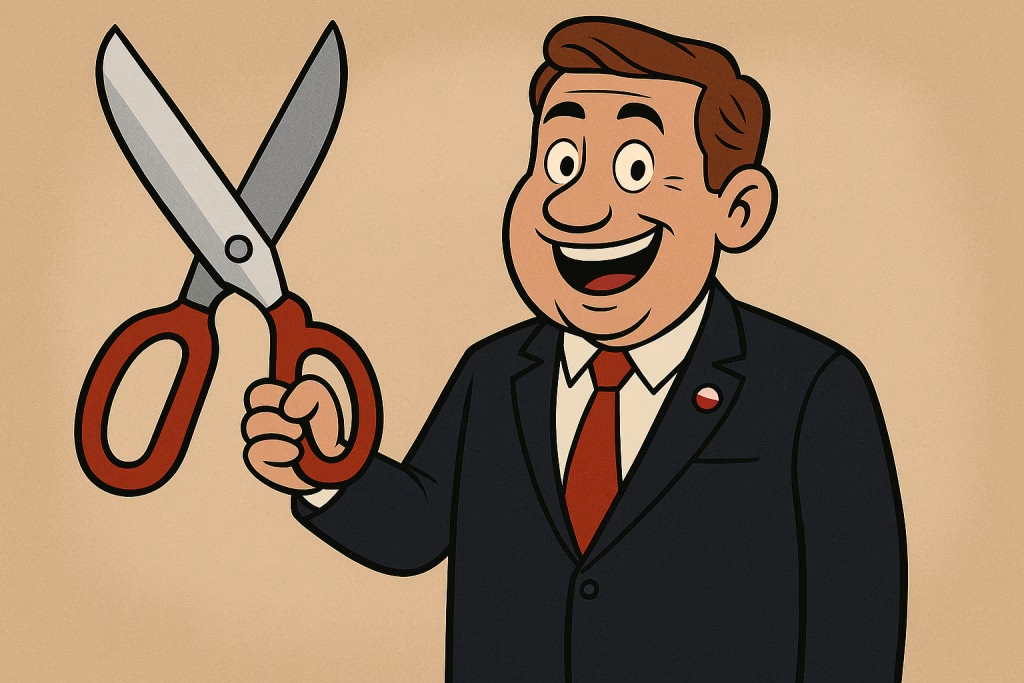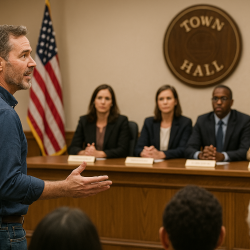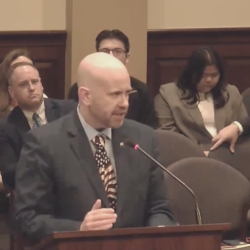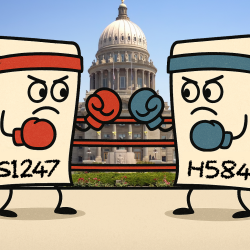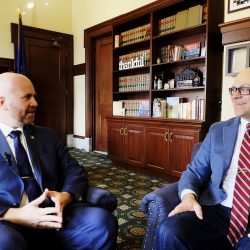It’s official: 2025 was the most conservative legislative session in living memory. Everyone agrees, even the teachers’ union which is gnashing its teeth in the corporate press. On Monday, I shared my thoughts on how it happened; today I would like to survey the status of the conservative movement in Idaho.
Every right-of-center organization in Idaho is taking a victory lap this week, and deservedly so. Success has a thousand fathers, while failure is an orphan. I don’t think it’s necessarily helpful to argue over who worked the hardest or which organization was most responsible, because I believe that everyone contributed to the cause in one way or another.
Even Young Americans for Liberty (YAL), an organization I’ve taken to task numerous times for its antics over the past six months, helped foster unity by attacking nearly all Republican legislators at some point. There’s nothing like a common enemy to bring old foes together, right?
Now that what’s done is done, I want to look forward to what we can accomplish together. Continuing to play tit-for-tat, to re-litigate old conflicts, to continue trading recriminations, accomplishes nothing. If your mission in politics is merely to destroy your enemies, you’ll never get anything done, and I want to get things done.
Here are five groups that I believe each played a role in this session’s success, and will be necessary for more success going forward:
Idaho Freedom Foundation
Let’s start with the Idaho Freedom Foundation (IFF). I have been critical of some actions of the organization this session, including this week when I used an IFF article as an example of what I think is the wrong tactic at this time. Readers might be tempted to jump to the conclusion that I despise the organization and want to see it burned to the ground, but that couldn’t be further from the truth.
IFF plays a vitally important role in promoting conservative policy in Idaho. Prior to its founding in 2009 by Wayne Hoffman and Heather Lauer, there was a massive gap in the conservative policy realm in Idaho. Hoffman came up with the idea of the Freedom Index, based on objective conservative and constitutional metrics, as a way of informing voters about how their lawmakers actually voted.
I don’t think the Index is perfect, and I always caution people about taking it entirely at face value, but it is nevertheless a valuable data point that can elucidate large differences in ideology as well as long-term trends in the Legislature. As I wrote on Monday, electing more conservative candidates plus adding an additional family values metric led to a huge overall increase in Freedom Index scores.
IFF president Ron Nate published his own legislative recap today, calling this “one of the most conservative sessions in recent history.” Nate pointed out that it wasn’t just due to more conservative legislators making better votes, but also an increase in the quality of bills overall:
In 2024, 139 bills having at least one floor vote were rated overall (not counting budget bills). Of them, 64 earned positive ratings, 58 were negatively rated, and 17 were neutral. The average rating of a bill in 2024 was minus 0.13. This year, the 2025 Legislature voted on 178 rated bills: 87 positive bills, 64 negative bills, and 27 neutral bills. The average rating was positive 0.16. Thus, the composition of the bills offered was markedly better this year for getting conservative results.
Where IFF shines, and where I hope it continues to devote its resources, is in the world of policy. Where I think it stumbles is when it gets in the middle of political infighting. Wayne Hoffman once told me he loved policy but hated politics, and I’ve started to understand that perspective more and more over the past year. Policy is clean, it’s the marketplace of ideas, it’s based on facts, while politics is a muddy, bloody, game that generates grudges and personal animosity, which can suck the life out of you if you’re not careful.
IFF does tremendous work on policy, often behind the scenes with little or no fanfare. Yet to survive as a nonprofit organization, it has to attract the attention of donors and make them understand what value they’re receiving for their money. It’s a tough balancing act, one I find myself having to confront in my own position. If IFF can maintain that balance, then it will thrive and continue to be an important part of the policy conversation in Idaho.
Check out IFF’s Freedom & Family Agenda for an idea of what policies the organization will continue promoting.
Mountain States Policy Center
Mountain States Policy Center (MSPC) is a much newer think tank, one that covers other northwest states as well as Idaho, but I believe it really came into its own this year. MSPC deliberately takes a much less confrontational tone than IFF, which has its upsides and downsides. MSPC president Chris Cargill helped shape the conversation around school choice and other important issues in this legislative session.
MSPC grabs headlines with events featuring national figures such as this Friday’s dinner in Coeur d’Alene with Judge Jeanine Pirro from Fox News. (I’ll be there, so make sure to say hello!) The organization stays away from social issues, preferring to stick to free markets. I believe it adds an important voice to the policy debate.
Check out MSPC’s wrap-up of the 2025 session to see how its priorities fared this year.
Idaho Freedom Caucus
The Idaho Freedom Caucus (IDFC) came into the session stronger than ever despite division caused by differences of opinion last year. Ten or eleven Republican lawmakers called themselves public members of the caucus, including four freshmen, with uncounted others working with them as private members. (As you know, I was a paid consultant with IDFC in 2024.)
On Substack yesterday, the IDFC shared a truly impressive list of policy wins from the 2025 session. Public members of the caucus sponsored or cosponsored 125 bills, with 62 of them being signed into law by Gov. Brad Little. These bills included prohibitions on mask mandates, medical freedom, tax relief, election integrity, instruction in fetal development, and school choice. The veteran members of the IDFC have matured into the leaders of Idaho’s conservative movement, and they deserve all the credit.
The IDFC has published a vision of freedom and liberty for Idaho, so check that out to see where the caucus plans to put its efforts going forward.
Gang of Eight
After the split with IDFC, Sen. Glenneda Zuiderveld joined Sen. Christy Zito and six freshman legislators in a new caucus that was aligned with the State Freedom Caucus Network (SFCN). With the name “Idaho Freedom Caucus” still being used by the IDFC, this group had no specific designation until its members started calling themselves the Gang of Eight (G8), which works as well as anything.
It seems to me that the G8 aimed to fulfill the original design of SFCN by forming a much tighter group than the IDFC had. They met together regularly, promoted each other’s content, and, most importantly, voted together. I disagreed with some of their tactics this year, such as objecting to ceasing reading of certain bills or attempting to call the house (prevent any legislator from leaving during debate), but nobody can deny their conservative bona fides.
In a joint newsletter published on Sen. Zito’s Substack, the G8 points out several good bills that would likely have failed without their presence in the Legislature:
Our votes mattered—especially in the Senate.
- S1023 – The Medical Freedom Act passed the Senate 19-14-2. (Senators Adams and Ruchti were absent. Adams likely would’ve voted yes, Ruchti no.) Without Kohl, Zito, and Zuiderveld, the tally would’ve flipped to 16-17-2. Medical Freedom would’ve died.
- H93 – School Choice passed the Senate 20-15-0. Again, without those three conservative senators, the bill likely would have failed 17-18-0.
Elections have consequences. The voters sent more conservatives to the Legislature, and as a result, more conservative legislation passed.
Sen. Zito and the six freshmen of the G8 all won seats in the 2024 primary that had been held by much more moderate Republicans in prior years. No matter what one might think about their tactics, winning those races (along with Sen. Zuiderveld holding her seat in District 24) was absolutely crucial to the legislative success we saw this year.
Unfortunately, some of their tactical choices and their alignment with YAL caused legislative leadership to essentially blacklist the G8, refusing to hear many of their proposed bills. Without mincing words, that sucked, and hopefully both sides are able to mend some fences during the offseason so this doesn’t happen again next year. Remember that folks like Rep. Heather Scott and Sen. Brian Lenney faced the same sorts of blacklists early in their careers, but have now become some of our most effective conservative legislators.
Citizens Alliance of Idaho
I can’t say enough good things about Citizens Alliance of Idaho (CAI), and it’s not because I did paid work with the organization as a contributing editor this session. Matt Edwards has built a great organization in just a few years, staking out solidly conservative positions in such a way as to build unity within the movement.
Lawmakers are invited to sign the CAI Pledge, a simple and straightforward list of values on which all conservative should be able to agree. Pledge signers this year include all members of the G8, all public members of the IDFC, and numerous other Republicans that don’t specifically align with any caucus or group. Even House Speaker Mike Moyle signed the pledge this year.
Edwards and his team will evaluate how each pledge signer voted on the most important bills of the 2025 session that relate to the pledge and then share their standing: good, questionable, or bad. Those in good standing can count on the resources of CAI to inform their voters as they look ahead to their reelection campaigns, while those in bad standing risk having a conservative challenger benefit from an endorsement instead.
CAI is hosting a training seminar in Boise on May 31 this year, and I highly recommend all potential candidates and activists to apply.
The Big Picture
There are too many other groups and organizations to list here, but it’s my hope that all of these will be able to work concurrently toward the same goal. We all want to keep Idaho what America was, to prevent the Gem State from following California, Washington, and Colorado off the cliff into a Marxist dystopian Hell.
Each group has slightly different ideas about specific policies, as well as different tactics, but I truly believe we can all work alongside each other to achieve our shared goals. The successes of the 2025 legislative session are proof that we win when we work together. Each one of us has an important role to play in this never-ending battle for the soul of our society.
Rhetoric is bound to become heated again as we head into the 2026 primary election season, but I hope conservatives can find a way to unify around the things we all have in common. Let us leave any remaining disagreements in the past and build upon the foundation of this year’s successes. Let us respect each others’ positions, values, and gifts and work together to keep Idaho great. In the words of the cowboy in the CAI promo, we ride together.
Gem State Chronicle is a reader-supported publication. To receive new posts and support my work, consider becoming a free or paid subscriber.
About Brian Almon
Brian Almon is the Editor of the Gem State Chronicle. He also serves as Chairman of the District 14 Republican Party and is a trustee of the Eagle Public Library Board. He lives with his wife and five children in Eagle.



